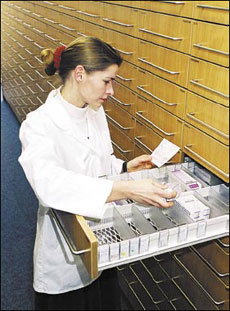Over exposure
BERLIN: Almost everyone has come into contact with antibiotics whether in tablet, syrup or ointment form. Antibiotics have been used to fight bacterial infections for more than 70 years. Serious diseases, such as tuberculosis or cholera, which 100 years ago were fatal for humans, no longer pose the threat they once did. But in many cases patients fail to use antibiotics properly.
A doctor exams a patient in Nanjing of Jiangsu Province. Experts strongly advise patients to be careful when taking antibiotics. Dong Jinlin |
"Classical illnesses that antibiotics are used against are bladder infections and tonsillitis," says Ursula Sellerberg of Germany's Berlin-based Association of Pharmacists.
Antibiotics are frequently used to prevent bacteria moving from the bladder to the kidneys. Side affects are a rarity.
"Antibiotic medicines are kind to the body," says Sellerberg.
But taking antibiotics also harms intestinal bacteria and can lead to diarrhoea in some people. Allergic skin reactions can also occur, if an antibiotic ointment is used for an extended period of time.
Consuming alcohol while taking antibiotics is dangerous. "It can lead to complications in the liver that magnify the affects of taking alcohol," says Constanze Wendt of the Hygiene Institute in Heidelberg. Antibiotics can also reduce the effectiveness of the contraceptive pill. Antibiotics function by preventing the growth of bacteria. They are produced in several different ways. "There are naturally occurring antibiotics such as penicillin but there are also synthetic antibiotics," says Sellerberg.
Antibiotics come in two categories: wide-spectrum and narrow-spectrum.
As the name suggests, wide-spectrum antibiotics are effective against a large range of bacteria. Narrow-spectrum antibiotics are used to fight specific types of bacteria. Because of the widespread use of antibiotics, some bacteria have become resistant to them. They can no longer be treated with conventional medicines such as wide-spectrum antibiotics. To prevent bacteria from becoming resistant, antibiotics can only be obtained with a doctor's prescription in most countries.
But that's not the case everywhere. "In Spain, for example, they can be bought over the counter. Resistance there is very high," says Sellerberg.
The pharmaceutical industry is also reluctant to release newly developed antibiotics onto the market to preserve their effectiveness in a serious emergency.
And most doctors are now careful to make sure they do not prescribe antibiotics too early in the treatment.
"In the case of children we treat a topical infection such as sinusitis with drops that reduce swelling," says Michael Deeg, an ear, nose and throat specialist in Freiburg southwest Germany.
An antibiotic is first used when an infection develops to a stage where pus is produced. But even at this stage doctors try to find the most effective method to fight the infection.
"A smear sample is examined in the laboratory to find the best way to fight the germ."
A pharmacy worker finds an antibiotic for a patient in Berlin. DPA |
Antibiotics work soon after they have been taken. "In most cases, the patient is free of symptoms within a few hours," says Sellerberg. But this is exactly the point where patients are most in danger of suffering a relapse.
If they stop taking the medicine too soon because they are feeling better, the bacteria may not have all been killed. Sellerberg strongly advises patients to follow their course of treatment for as long as their doctor tells them to. That will prevent the chance of some bacteria surviving treatment and becoming resistant. A patient who is again infected with the same bacteria can no longer be treated effectively with the same antibiotics.
Patients should also be sceptical when it comes to taking antibiotics.
"Antibiotics should not be prescribed as a precautionary measure. They should only be given when an infection is present," says Wendt.
Taking antibiotic tablets to treat catarrh is therefore the wrong course of treatment to follow.
Most people are still not fully aware that antibiotics are not effective against viruses and cannot be used to fight the common cold.
But Wendt says antibiotics are still the most effective way of treating a serious bacterial infection such as meningitis or a lung infection, which can be fatal if not treated in time.
DPA
(China Daily 05/30/2007 page19)
















